 |
Bradley & Co. Ltd
(Beldray)
Mount Pleasant, Bilston |
 |
10. Workers and the Social Life at Beldray
Over the years thousands of people worked at Bradley's
but we have little information on their working lives. We have
already seen that a social club, tennis court and bowling green were
provided during the First World War and that all this continued until
the great factory rebuild of the 1970s. There were doubtless works
teams in other sports as well. And there were works dances,
carnivals and other events. A lot of photos of a few of
these events are available and will be added to these pages when time
serves. But three men can be mentioned now.
George Phillpot tells the story of Billy Owens
and Billy Booth:
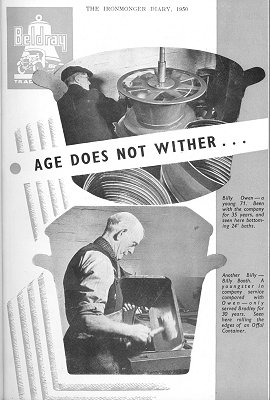 |
The advert on the left comes from 1950. The man at
the top is Billy Owens, then aged 71; and below is Billy
Booth. Billy Booth appeared in several Beldray adverts.
He was used to symbolise the traditional craftsmanship of
the factory. One of these adverts is shown on the
right. I knew him very well, although he was old enough to
be my father. He lived near us, in Beech Road, and we
sometimes walked to work together - before I got my first
bike! The shop in which we worked was known as Hayward's
Shop, for the simple reason that that was the foreman's
name. Billy's machine was the only piece of machinery in
that shop. Everything else was bench and hand work. In the
picture he is rolling together the body and the bottom of an
oval bath tub, to make a watertight joint and seal. |
|
Note that in the advert above Billy Booth's
age is not mentioned. I have been shown a letter by a
descendant of his, which was sent in response to his
daughter who had written to ask if Billy could retire.
The reason for that was that in those days you were not
entitled to a pension but the company might grant you one if
you had worked there many years. The letter in reply,
sent in December 1953, comes from Hermon Bradley saying "I
am surprised to hear he is as old as 76" and that "he has
been a very excellent servant to the company in all ways".
And "if he retires he will certainly get a pension and he
will also get a lump sum for the number of years he has been
here ... and I certainly agree that if it is knocking him up
it is certainly time he retired". (The letter head of
this letter is shown on an earlier page).
And Margaret Weston provides the story of
her father, Bill Chance:
Isaac William Chance (always known as Bill)
was born in 1905 and joined Bradley's, at the age of 14, in
1919. He worked there until he was 65, when he retired
in October 1975. In December 1969 he received a
presentation marking his fifty years with the company and a
letter of thanks and congratulations from the then Managing
Director, Mr. K. H. Rowe-Ham.
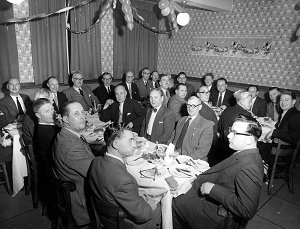 |
Bradley employees at a Christmas dinner,
date unknown. Bill Chance is third from
the left, turning towards the camera. |
| Probably taken at the same event. Bill
Chance is third from the left. Fourth from the
left is Sim Fereday. |
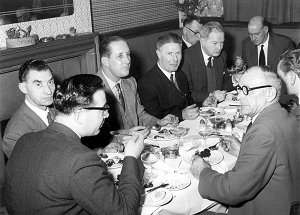 |
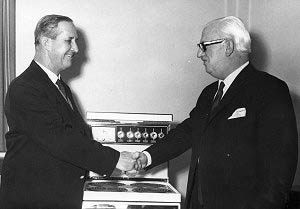 |
Taken in October 1970 when Bill was retiring
at the age of 65. The cooker was one of
his gifts. Making the presentation is the
Managing Director, Mr. K. H. Rowe-Ham. |
| Probably taken on the same occasion, with
Bil on the left and K. H. Rowe-Ham in the
centre. The man on the right is
unidentified but is probably another retiree
(and that may be his presentation television set
behind him). |
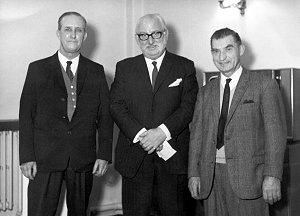 |
|
In Ned Williams' "Black Country Folk at Werk",
Uralia Press, 1989, Joan Powderly gives an account of the
years she worked at Bradleys. No dates are given but internal
evidence suggests that she worked there from about 1944 to about
1962. Ms Powderey recalls how her Gran used to say "Yo doh
want to ever go to Bradleys. It's the last place God made!".
But she went, nevertheless, and seems to have found that the work
was hard but well paid. She started on a hand press "making
buckets, and mop buckets and all sorts". She says "we enjoyed
working there because there was a gang of us and we used to tease
one another"; and then sang along together, despite the protests of
the foreman, because "that was one way of getting rid of the
boredom, because basically they were boring jobs". In due
course she and another girl were put onto making a new line -
ironing boards. For this purpose she became a spot welder and
jigger. "You had to learn the job as you went along. In
fact I can never remember learning - it just seems as if you always
knew".
|







